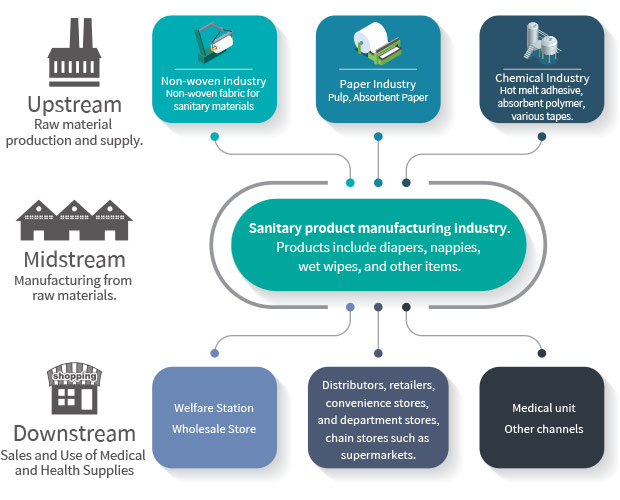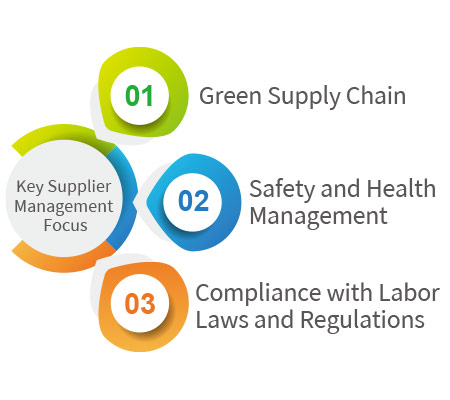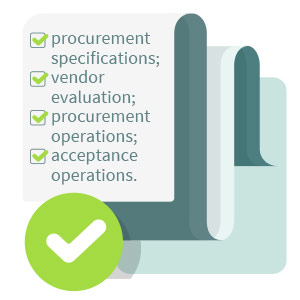Supply chain management
Industry upstream, midstream, and downstream relationships
Fuburg’s main product is adult diapers, with raw materials including pulp, superabsorbent polymer, PE film, waterproof paper, and hot melt glue, among others. In the diaper industry, it is part of the downstream nonwoven fabric industry (nonwoven fabric for hygiene products). Diapers generally consist of three parts: surface material, absorbent material, and leak-proof layer. The surface material is made of nonwoven fabric, which does not absorb water and keeps the top layer dry against the skin. As for the absorbent material, the layer structure may vary by brand, but it typically includes cotton pulp, superabsorbent polymer, and absorbent paper. The absorbent paper helps guide the diffusion of urine and assists with the absorption of the cotton. The leak-proof layer at the bottom is made of low-density PE plastic, which prevents urine from seeping through to clothes or bed sheets. Finally, adhesive tape, elastic bands (made of natural rubber or PU thread), and tape-attached areas are added to secure the position of the diaper. The following diagram illustrates the upstream, midstream, and downstream relationships in the industry:
Industry upstream, midstream, and downstream relationship diagram.

Local Procurement
Fuburg’s procurement strategy has always been primarily focused on supporting local procurement. This not only drives domestic industry upgrading, reduces dependence on foreign suppliers, and increases local employment opportunities, but also promotes local economic prosperity and reduces costs by saving transportation energy. Fuburg hopes to share the benefits of growth with local suppliers and achieve a win-win goal.

Supplier Management Key Points
Before placing formal orders with major suppliers, Fuburg conducts on-site inspections and requests relevant proof of documents from suppliers. Through supplier evaluations, Fuburg assesses supplier quality, pricing, costs, delivery performance, environmental practices, occupational health and safety, hygiene, technology, and other factors to ensure that suppliers meet company standards.

Supplier Audit and Counseling
Fuburg regards all suppliers as partners and is committed to establishing long-term, stable, mutually beneficial relationships with them. To enhance the overall competitiveness of the supply chain, the company adopts relevant quality assurance operations management, including: 1. procurement specifications; 2. vendor evaluation; 3. procurement operations; 4. acceptance operations.
In addition, the key points of audit and counseling management are: supplier key management policies, major/minor supplier management, and the introduction of green supply chain concepts.

FUBURG has formulated “Regular Supplier Assessment Management Measures”, visits factories from time to time to assess the suitability of suppliers, and regularly evaluates each supplier. It maintains a good relationship of mutual trust with suppliers in the long term and works together towards quality and technology improvement. Therefore, suppliers are evaluated in four aspects: quality, cost, delivery time and service. A total of 35 suppliers were assessed in 2023, and the assessment results are as follows:
| Rating | Number of Raw Material Suppliers | Number of Outsourced Product Suppliers | |
| Passed | Class A | 10 | 3 |
| Class B | 8 | 4 | |
| Class C | 2 | – | |
| Unqualified | Class D | 8 | – |
C-grade suppliers receive enhanced guidance, while D-grade suppliers are replaced by other qualified vendors.
